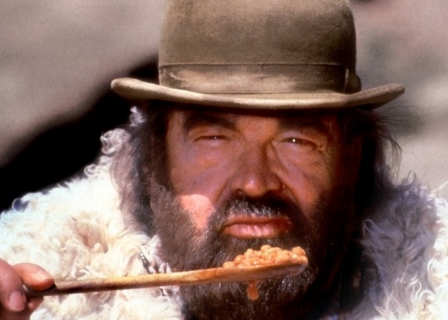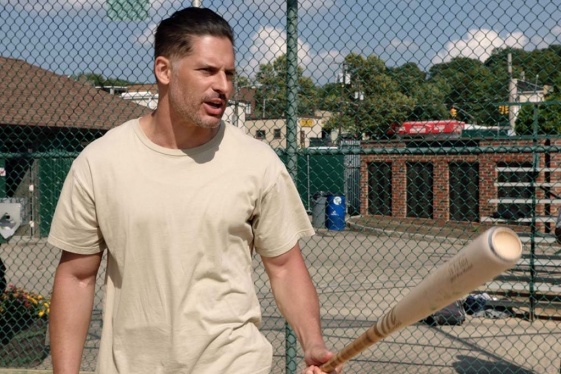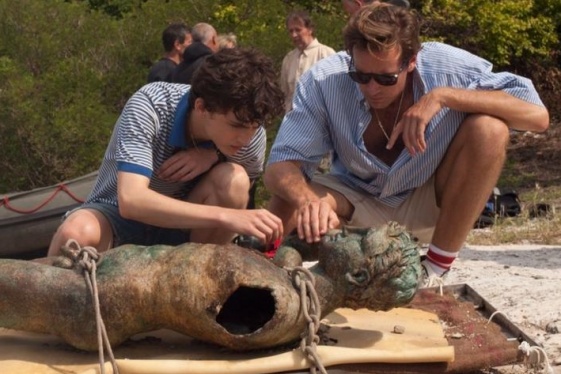

WTI Magazine #81 2016 July 15
Author : Edoardo Peretti Translation by:
Last June 27 Bud Spencer passed away. Carlo Pedersoli, better known as Bud Spencer, was a man of many lives, and an absolute protagonist of the history of Italian cinema, especially the more popular. Born in Naples in 1929, his first life, before arriving on the big screen, is that of swimmer: in the fifties he wins 11 Italian championships in the 100 meter freestyle (in addition to five silvers and two bronzes) and participates to two Olympic Games. He also is in the water polo Italian national team, where he wins an edition of the Mediterranean Games.
After ending his sport career, for a period Carlo emigrates to South America where he works for Italian and American companies. But his impressive physique attracts the attention of the Italian cinema, which calls him as an extra in several films: he is a jealous and abusive boyfriend in the famous Mario Monicelli's "Un eroe dei nostri tempi" (A Hero of Our Times), one of the best comedies of Alberto Sordi's early career.
Meanwhile, in the early sixties, Carlo works as a musician and lyricist; the decisive event takes place in 1967, when he accepts - apparently with reluctance and after initially refusing - to participate in the Western "Dio perdona ... io no!" (God forgives ... I don't!). On the set Carlo meets Mario Girotti; two protagonists are recommended, as was already happening to several stars of the Italian popular productions of the time (especially westerns and horror), to Americanize their names, in order to enhance their international attractiveness. This is how and when Carlo Pedersoli and Mario Girotti become Bud Spencer and Terence Hill. The name Bud Spencer is a tribute to the American culture; Bud in honor of the famous beer, and Spencer in honor of the great actor Spencer Tracy.
Bud and Terence work very well together, also as a contrast between the Terence's slender body and Bud's imposing one. The two then begin a partnership that dominates for at least 15 years the popular Italian cinema, and is also exported abroad, particularly in Germany and the United States. In many westerns and police movies the two play the roles of some kind of isolated executioners, nonconformist and always siding with justice and the right side, even when seemingly scoundrels. Sometimes their roles are those of apparent enemies, but able to ally to achieve a common goal. All this, without avoiding the rough manners: their films are in fact famous for the extensive use of slaps and punches, enhanced by almost comic sound effects and always seen with a certain irony.
Among the two Bud Spencer is, with his imposing and rough physique and his vibe of giant who is gentle but not convenient to anger, the character more inclined to start a fight. These films are simple, unpretentious but certainly not stupid, witnessing a season of the Italian popular cinema far away not only from art, but also by a somehow more serious and meditated cinema. And above all they were, because of their simplicity, hugely successful film, so much so that there are few actors and protagonists of our cinema to have achieved Bud's and Terence's intergenerational and international fame. Their first success, as well as the most famous, is the ironic spaghetti western "Lo chiamavano trinità" (They Call Me Trinity), dated 1970, a parody of the Sergio Leone westerns.
Bud Spencer has also worked alone, but not getting the same success of the movies that saw him together with his colleague-friend.
Below is a selection of films that made Bud Spencer and Terence Hill's partnership celebrated all over the world: "Lo chiamavano trinità" (They Call Me Trinity) (1970) and its sequel "Continuavano a chiamarlo trinità" (Trinity is still my name) (1972); "Altrimenti ci arrabbiamo" (Watch Out, We're Mad!) (1974); "I due superpiedi quasi piatti" (Crime Busters) (1977); "Io sto con gli ippopotami" (I'm for the Hippopotamus) (1979); "Pari e dispari" (Odds and Evens) (1979); "Nati con la camicia" (Go for It) (1983).
You may be interested
-
New York Italians Movie Night: "C'eravamo ta...
Dear Friends, New York Italians in collaboration with Fordham University, Department...
-
'A League of Their Own' director Marshall dea...
Actress and director Penny Marshall, whose love of sports made her a regular in the Los An...
-
'Avengers: Infinity War' Directors Inducted I...
The Russo Brothers were a pair of the Marvel Cinematic Universe's best directors even prio...
-
'Boardwalk Empire' Season 5 News: Vincent Pia...
Recently, actor Vincent Piazza, who plays up-and-coming gangster Lucky Luciano on the show...
-
'Bottom of the 9th': Film Review
With films like Two Family House and City Island, director Raymond De Felitta found easy c...
-
'Buongiorno Papà' vince Nice Festival Usa
'Buongiorno papà' di Edoardo Leo, film sui quarantenni single in Italia, interpretato da R...
-
'Cabrini' film features nearly 40 Buffalo loc...
Parts of Western New York have transformed into movie sets as crews filming "Cabrini" take...
-
'Call Me by Your Name' and 'The Shape of Wate...
The Los Angeles Film Critics Assn. had lots of love for Luca Guadagnino’s “Call Me by Your...










